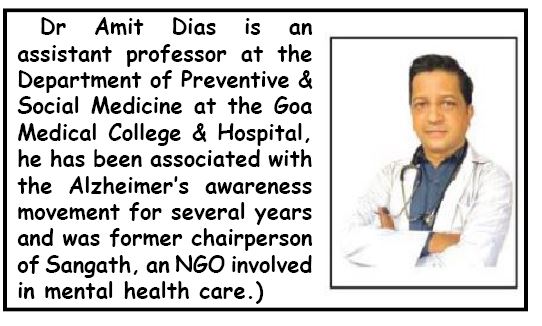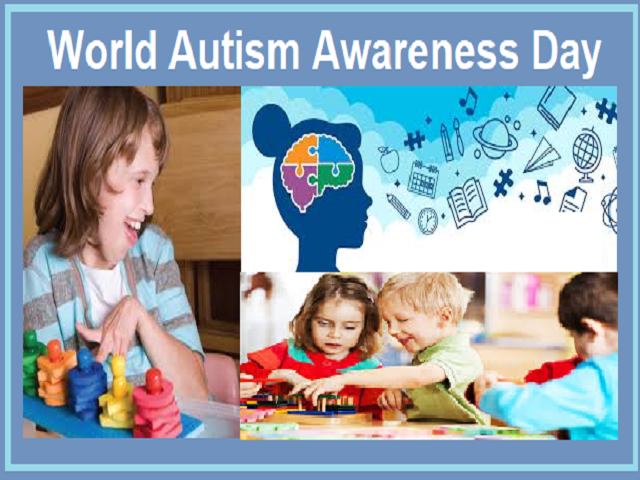An Autism Day Special!
An interview with Dr Amit Dias
April 2 was World Autism Awareness Day. Goan Observer spoke to Dr Amit Dias to get a better understanding of the spectrum of Autism. “We need to break the barriers and celebrate diversity- accept the difference, not the indifference,” says Dr Dias, as he urges everyone to empower autistic voices.
Goan Observer: We hear a lot about autism these days, could you simplify the term for our readers?
Dr Amit Dias: Autism is a lifelong, non-progressive neurological condition, typically appearing below the age of three. It significantly affects verbal, and non-verbal communication and social interaction. The children could exhibit stereotyped or repetitive movements, use of objects or speech. They may have highly restricted fixated interests. They could be strongly attached or preoccupied with certain objects.
Q: What is the Autism spectrum?
A: The signs and symptoms of autism and associated behaviour could present in a wide variety of combinations ranging from mild to severe. Which is what makes the diagnosis challenging. One can be on the spectrum and function extremely well while on the other hand, some may have a profound disability and may need substantial support.
What could make matters worse is that children with autism often have co-occurring conditions, including epilepsy, depression, anxiety and attention deficit hyperactivity disorder, as well as challenging behaviours such as difficulty sleeping and self-injury.
Q: Can you tell us what causes autism?
A: There is no known specific cause for autism. It is considered to be multifactorial. There are changes in the brain in children with autism. Hereditary genetic factors and environmental factors could be responsible. Autism tends to occur more frequently in some individuals with certain medical conditions such as Congenital Rubella Syndrome, untreated phenylketonuria, etc.
Q: How can parents recognize the early signs of autism?
A: Parents play an important role. Every child is unique and develops at his/her own pace. Children with autism spectrum disorder usually show some signs of developmental delay before age 3 years. One should consult a doctor if they notice the following in the child:
- By 6 months the child does not respond with a smile or a happy expression
- The child does not show facial expressions (happy sad angry surprised) until 9 months
- By 12 months the child does not babble (repeat syllables containing a consonant and a vowel like ba-ba-ba)
*By 14 months, the child does not make gestures – for example, point or wave goodbye - Till 16 months – the child does not say a word
*Does not show you something interesting by 18 months - Does not say two-word phrases within 24 months
*Does not join children in play by 36 months
*Loses language or social skills at any age
*The child does not keep eye contact
Q: Can we prevent autism?
A: Unfortunately as of now we are not aware of definite measures to prevent autism spectrum disorder. Ensuring optimal antenatal care during pregnancy and prior vaccination with the rubella vaccine, could help to some extent. However, we do have treatment options. Early diagnosis and intervention are very helpful and can improve behaviour, language and skill development. Children may not outgrow the symptoms of autism spectrum disorder, they can learn to function well with the right kind of support. Though early interventions show better results, intervention is useful at any age.
Q: How big is the public health problem of autism spectrum disorders?
A: It is quite common. Everyone would know some child who is on the spectrum. Those with milder presentations are often underdiagnosed. According to the WHO, around 1 in 100 children have autism. The prevalence varies substantially across studies. Many, especially in the low socio-economic groups do not have access to appropriate and affordable care for their child with autism and find it difficult to cope. It’s is not only an individual that is affected. The entire family including the grandparents are affected while caring for a child with autism.
Q. What is your message on Autism Day?
A: The theme this year is “Empower Autistic People.” We need to move towards this goal. We need to be ready to accept this difference and not the indifference towards people with autism. Given an opportunity a person with autism can contribute to society. We need to embrace the concept of neurodiversity — we are all pieces of the same jigsaw puzzle. All people, including people with autism, have the right to the enjoyment of the highest attainable standard of physical and mental health. It is our collective responsibility to build an inclusive society.
People with autism, are often subject to stigma and discrimination, including unjust deprivation of healthcare, education and opportunities to engage and participate in their communities. This should change and we need to be part of the change and empower people with autism.

